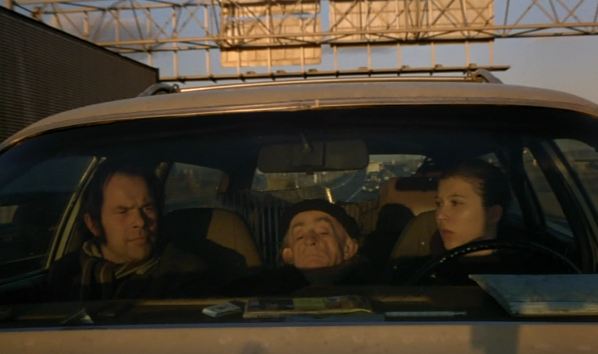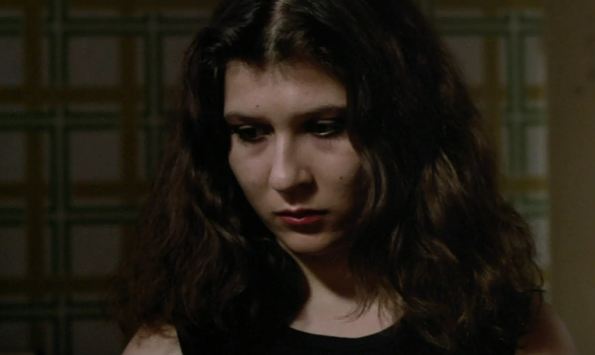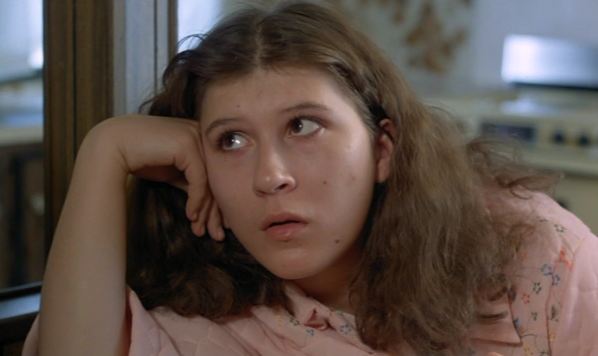Stroszek by Werner Herzog is many things, though I am guessing that its first draw is that it mainstreams outsider art. The outsider is the real life Bruno Schleinstein a self-taught musicia, who developed his own brand skills on the piano, accordion, glockenspiel and handbells. He would play in back gardens in Berlin, performing 18th and 19th century style ballads, and famously noted that he transmitted his songs (German: durchgeben) rather than sang them.
Herzog cast Schleinstein as the lead in an earlier film, The Enigma of Kaspar Hauser (1974) and wrote Stroszek for Bruno later, even setting it in the transmitter’s own flat.
Eva Mattes at the wheel in Stroszek (1974)
In his youth, Schleinstein was institutionalised much of the time, and this is a great theme in the film Stroszek. The character Stroszek is bullied by the state and by the local criminals, and he only wants to understand the mysteries of life and play his songs. Eventually having had enough of getting kicked in Stroszek heads for the USA with a few motley friends, to try his fortune there. Schleinstein is such a clown and is so beloved of the director, that Stroszek wrongly appears as his film, and not Eva Mattes' film. Eva Mattes steals the show for me in Stroszek, and the more you see her suffer these idiots she has as friends, and the more incapable they appear, the more she presents this to us, right under the director's nose and in defiance of Schleinstein's antics, the more we see her presenting the lot of all woman, and not just that of one unlucky prostitute.
You cannot imagine Schleinstein or Clemens Scheitz both pictured abovemas driving a car, and as outisders there is in fcat nothing that they can do to fit in, and Eva Mattes' character does it all.
This is splendid, and of course Stroszek is a huge cult film; Ian Curtis watched it just before he killed himself; but for me the film does suffer from the fact that it is not really Bruno Schleinstein’s story, but rather that of Eva, the character played by Eva Mattes. So even though Stroszek represents the cutting edge cinema of its day, it is still guilty of relegating the female.
Eva Mattes plays a prostitute. Of course the European cinema of the 50s 60s and 70s, especially new wave directors, and notably Godard and Fassbinder, were interested in prostitution. Prostitution is a theme that arises in nearly every production both of these menmade. This is basically because the new wave was basically brought to the light by Marxism and they never let go of this. For Fassbinder, Godard, and now Herzog, there is no better dramatic metaphor than the prostitute for presenting the commodification of a person and abuse of the ownership of their labour.
However, in Stroszek, Herzog in effect prostitutes Eva Mattes’ character in its entirety, assuming that the male lead is going to be more interesting, which he is not. Stroszek as a character has actually little to offer, other than his weird charm; which is that of a long term drunk. He bumbles through the film and is bullied and does his thing, and we are expected to applaud that. But Stroszek the movie is the story of Eva Mattes’ character Eva; she is the one who suffers, pays the most, moves the narrative, and finally moves on and devlops; while Stroszek himself just trundles to an inevitable end. Her prostitution is complex; her pimp is brutal, Stroszek can offer no protection; and what she does she does for herself.
The whole reason for this film though is the profiling of Bruno Schleinstein, and we can’t take that away from it. But it’s still interesting that just because Schleinstein has outsider value, we don’t even notice that more powerful things are happening to other characters. And this is Eva Mattes’ film, for those reasons.
Part of the appeal of Stroszek for Herzog and audiences too it seems is that many of the parts (including that of Stroszek himself) are played by non-actors. Whereas Fassbinder used non-actors in his films they learned how to act in his company. It’s a little different in Stroszek and so Stroszek lies territorially between documentary and fiction. The result is that the non-actors add the oddity and charm that makes the film the cult favourite that it is. It even makes the film a kind of freak show, in a way. It is something very moving also, generally an effect of the music and the lonely images, the combined hangdog sadness of Schleinstein and the real lanscapes and locations handpicked from America by Herzog.
The Trailer for Stroszek is on YouTube, many times over. Reading the comment threads, they seem to be mostly made up of men raving about what a genius Schleinstein is or was, but are also mad eup of comments on Herzog's own techniques, which were and are pretty individual too.



